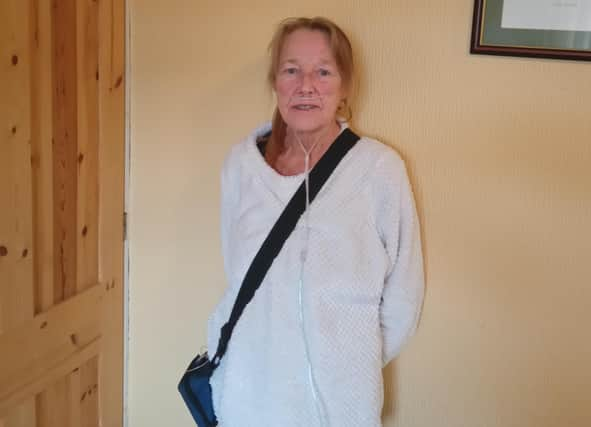New Mills woman with life limiting condition wants to raise awareness so help others who may be suffering in silence


Since Diane Kaylor was diagnosed with Pulmonary Hypertension her health and quality of life has declined so much that she needs to constantly be on an oxygen machine.
The 60-year-old was already under the care of the Royal Hallamshire Hospital in Sheffield for around five years for Rheumatoid Arthritis and then interstitial lung disease when the breathlessness she experiencing started getting worse.
Advertisement
Hide AdAdvertisement
Hide AdShe then developed small red splotches on her hands and face – a tell-tale sign of a condition called scleroderma which can develop into pulmonary hypertension.
Diane said: “I’m only 60 but my body feels 90. There are days when I feel superglued to my armchair – I just don’t have any energy to do anything.
"I’m not the woman I was, I’m so far away from her and everything has changed.
"Every day is a struggle just to do something because I suffer with such fatigue I have no desire to move. But then I remind myself how wonderful the NHS have been and the support of my friends and family and that spurs me on to keep going.
Advertisement
Hide Ad"There is no cure and it truly limits your life because you have to think about where you can go with an oxygen machine and I don’t think many people know about it. I know I’d never heard of it until I was diagnosed.”
Advertisement
Hide AdPulmonary Hypertension can affect anyone regardless of age and causes high pressure in the pulmonary arteries - the blood vessels connecting the heart and lungs - and can leave people unable to work or manage everyday activities. There is no cure, and the condition can eventually cause heart failure as the heart has to work harder to pump the oxygen around the body.
It is a rare condition with only 8,000 people living with it in the UK but is often misdiagnosed as asthma or anxiety.
Dr Iain Armstrong is the chair of the Pulmonary Hypertension Assoication UK and nurse consultant at the Sheffield Pulmonary Vascular Disease Unit at the Royal Hallamshire Hospital.
Advertisement
Hide AdHe said: “Pulmonary hypertension has a devastating impact on people’s lives - and because its symptoms are so similar to those of more common conditions like asthma, patients often wait too long for a diagnosis.
“It is rare and misunderstood and as a society we need greater understanding of hidden disabilities.”
Advertisement
Hide AdDiane is speaking out and telling her story during Pulmonary Hypertension Awareness week which runs until Sunday November, 7.
At the beginning of her treatment she was prescribed Viagra which is good for relaxing and widening the blood vessels and for a couple of years, her condition was pretty stable although she still experienced breathlessness.
Advertisement
Hide AdDiane said: “Following a severe chest infection and a hospital stay at in 2019, I had to begin using home oxygen from time to time to keep the oxygen levels in my blood at an acceptable level otherwise I’d feel tired, breathless and headachey, similar to what some people experience at high altitudes.”
Towards the end of 2019 it became clear her condition was becoming far worse and Diane attended the clinic at the Hallamshire where after further tests, it was confirmed that the Pulmonary Hypertension had progressed and that the right hand side of her heart was becoming weak.
During 2020, Diane tried three or four different medications but none seemed to be helping and she was experiencing quite a steep decline physically, being able to do less and less because of breathlessness and fatigue.
Advertisement
Hide AdBy this time she was using six to eight litres of oxygen day and night and was assessed as a candidate for lung transplant but because she has other complex health conditions, it was felt that it would not be a good outcome for her.
Advertisement
Hide AdThe last option open for Diane in terms of drug therapy was to have a Hickman line, which is an IV line permanently fitted and in December of last year she had a 10-day hospital stay for that procedure and to learn how to manage it on a day to day basis.
Diane said: “I was extremely anxious as I felt the potential for getting it wrong was quite high. I had to work really hard to reassure myself that I could do this and because I had no choice but to do it, I eventually became used to the routine.
"Since being on this medication my condition has at least stabilised and I don’t appear to be getting any worse, so it’s halted the steep decline I was experiencing.”
Diane does not go out independently anymore, she has lost two stone in weight as she has no appetite to eat while being on the oxygen and says life often seems to have shrunk to all matters medical and very little else so she pushes herself to leave the house, meet friends and leave her comfort zone.
Advertisement
Hide AdAdvertisement
Hide AdHowever, Diane remains positive and says she feels fortunate to have come across Buddhism and meditation some 20 years ago and this really helps and supports her in being more accepting this is just how things are rather than causing herself more suffering by railing against it.
She added: “I feel fortunate having the knowledge this condition is life-limiting as I get the opportunity to prepare for the end of my life, mending any bridges, saying what I need to say to loved ones and putting my affairs in order so that hopefully when the time comes I can die without too many regrets.
"Plus I get to spend my rainy day savings as the rain is here now.”